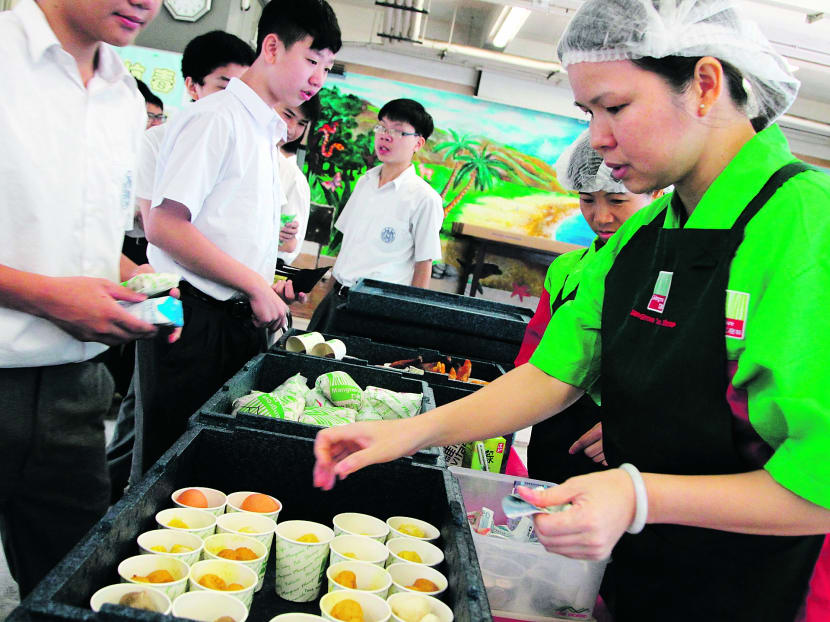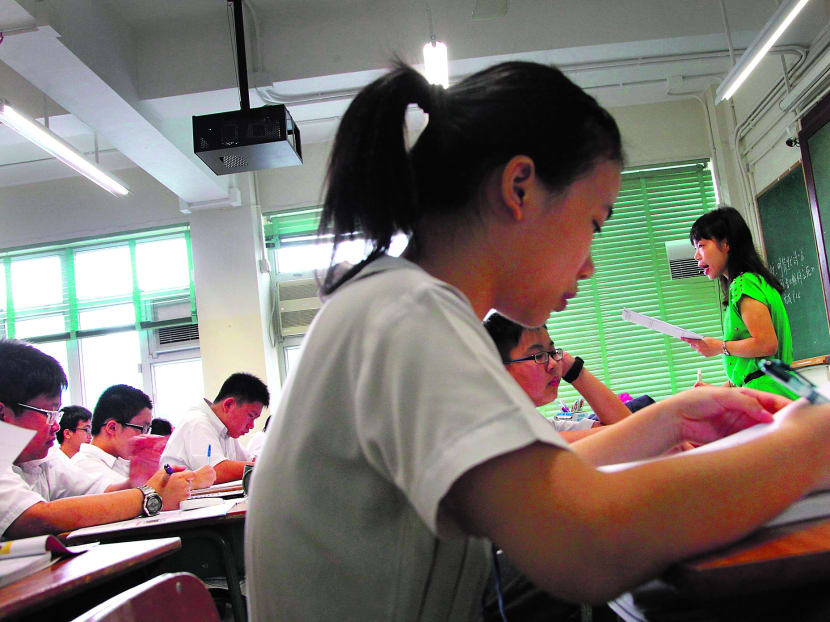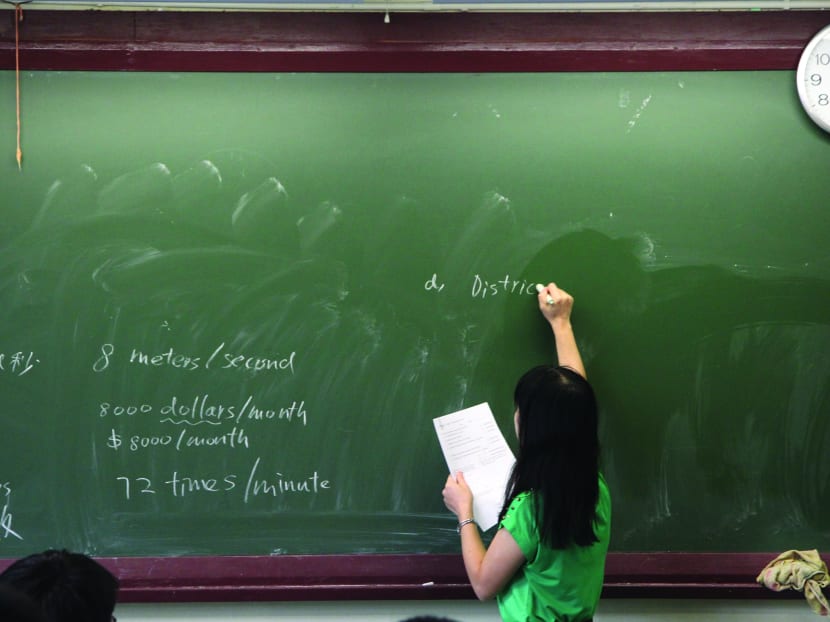The long and winding road of Hong Kong’s education changes
As part of the education policy changes announced during last month’s National Day Rally, pupils here will no longer be given aggregate scores for the Primary School Leaving Examination (PSLE). Instead, they could be given letter grades and placed in bands like in the O- and A-Level examinations. The change to PSLE scoring will be implemented several years from now.
As part of the education policy changes announced during last month’s National Day Rally, pupils here will no longer be given aggregate scores for the Primary School Leaving Examination (PSLE). Instead, they could be given letter grades and placed in bands like in the O- and A-Level examinations. The change to PSLE scoring will be implemented several years from now.
In Hong Kong, national exams for 12 year olds were scrapped under an overhaul of the education system that began in 2000. Following the reforms, results of Upper Primary internal tests are used to allocate students into three bands, reduced from five under the old system. Band 1 students have priority in their choice of secondary school. To mitigate the uneven standards across schools, the results of Primary 6 pupils are benchmarked against how their seniors from the same school did in standardised sample tests. Secondary school education was also cut from seven to six years, with pupils taking a diploma exam at 18 years old — their first and only national exam — which determines their chances of clinching a highly coveted university place. In the second instalment of a two-part report on Hong Kong’s education reform experience, TODAY looks at the changes to its secondary school system.
HONG KONG — There is no such thing as a Band 1 school or a Band 3 school officially, educators and parents in Hong Kong frequently reminded this reporter during discussions about the territory’s secondary education system.
However, the reality is that secondary schools are categorised by locals based on the academic calibre of the students which they admit. Under an admission process that accords priority to the choices of top primary school pupils, this was perhaps an inevitable outcome. A quick search online will throw up the unofficial bands of various secondary schools. A parent, Mr Paks Lee, 54, said: “No one wants their children to enrol in ‘Band 3 schools’.”
Previously, secondary school places were assigned to pupils, who are categorised across five bands based on their scores in internal tests conducted by their primary schools and how well they did for the Primary 6 national exams.
As part of the sweeping reforms implemented in the Hong Kong education system since 2000, the national exams for 12-year-olds were abolished — only the results of internal assessments at Primary 5 and 6 are taken into account, benchmarked against how their seniors performed in standardised sample tests — and the number of bands was cut to three to diminish the “labelling effect”.
Under the new admission process, parents of Primary 6 pupils fill up a form to indicate their preferred choice of secondary school. They can choose up to 30 secondary schools within the district of their primary school, and three that are outside the district. Band 1 students get the first bite of the cherry in being allocated a secondary school, followed by those in Band 2 and lastly, the Band 3 pupils.
Schools are also given the autonomy to recruit up to 30 per cent of their Secondary 1 intake under a discretionary admission scheme, which takes place about three months before the centralised exercise.
School leaders can select prospective pupils based on academic results or non-academic talent, under criteria that are made public.
Mr Tai Hay Lap, one of the leaders behind the 2000 education reforms, described the territory’s secondary school allocation scheme as “one of the greatest innovations by the Hong Kong government”.
“What is the fairest way to allocate? Based on ability? But even that is being challenged now, because do you have the ability due to your education or your resources?” said the recently-retired secondary school principal, adding that the present scheme incorporates parental choice, the students’ banding, proximity and randomisation.
THE STIGMA OF BANDING
While the present situation is an improvement from the past — when students were categorised more finely and there was less social mixing in secondary schools — parents and educators said there is still stigma attached to schools that take in the lesser lights.
The fact that different language mediums are used in schools does not help matters. In Hong Kong, schools that adopts English as the main language of instruction are highly sought after.
In 2010, the authorities fine-tuned the language policy and allowed public schools the discretion to use English during some school activities or classes. Public schools that are using English as the main language of instruction are required to consistently attract better students. Specifically, at least 85 per cent of students in each Secondary 1 class must be assessed to be in the top 40 per cent of the entire cohort in terms of academic performance.
The schools also need to fulfil teacher capability criteria, among other things. In other words, a vicious circle — or a virtuous one, depending on how one looks at it — is perpetuated. Popular schools taking in the Band 1 students will be able to use English as the main language of instruction.
In 2009, Professor Cheng Yin Cheong of Hong Kong Institute of Education made an observation as part of his published study that Chinese medium instruction schools were suffering “from being perceived as weaker schools for less able students”.
Following the education reforms, the variance between Hong Kong schools’ performance in the Organisation for Economic Co-operation and Economic Development’s Programme for International Student Assessment (PISA) has fallen.
Comparing Hong Kong students’ PISA results in 2000 and 2006, the variance dropped by about eight per cent. However, the reduction of the number of bands has created challenges in the classroom for educators. Now, the middle tier of Band 2 students, for instance, can possess wildly different academic abilities, they said.
New Asia Middle School Principal Wong Wai Ting, whose school takes in a mixture of Band 2 and 3 students, said that, for instance, while some new students can string together English sentences effortlessly, others only know basic English words.
To overcome the disparity in academic standards within the classroom, the school curriculum is modified from time to time — Hong Kong practises a decentralised school management system — and pupils in the same class are split into different groups for various subjects depending on their abilities.
Mr Kwok Biu, a teacher at the school, said that he has to spend more time supervising and providing remedial classes for weaker pupils. Help for teachers in terms of curriculum design will be good, he said, noting that handling mixed ability classes come with a heavier workload.
Dr Catherine Chan, Deputy Secretary for Education (Curriculum and Quality Assurance) in Hong Kong’s Education Bureau, acknowledged that managing student diversity is still one of the biggest challenges for schools. While training for teachers has been provided in recent years, there is “room for improvement”, such as in the sharing of good practices and teaching resources, she said.
Observers are hoping that over time, with teachers better trained and the differences in schools’ academic performances narrowed, banding can be eliminated completely.
Hong Kong University’s (HKU) Professor Cheng Kai-ming, who was among the forerunners of the education reforms, reiterated that segregating students based on academic ability will always perpetuate social stigma. By creating a structure where top students receive the best education, “we will lose a large group of young people who will bear with them dissatisfaction from the very beginning of their life”, said the former educator, who chairs his university’s education faculty.
‘LIFE CHANGER’ AT 18
Under the education reforms, a new academic structure for secondary and tertiary education was rolled out in Hong Kong in 2009: Secondary school education was made universal and the duration was reduced from seven to six years. Correspondingly, universities started offering four-year undergraduate education instead of three.
At the end of their secondary education, 18-year-olds sit for the Hong Kong Diploma of Secondary Education exam — which is the only national exam post-reform. Also taking into account results of internal schools exams, the students are then ranked according to five levels for each academic subject — instead of letter grades of A to F, as was the practice under the old secondary school national exam framework.
The first batch of students under the new structure graduated from secondary school last year. They were also the first to go through a compulsory new subject, Liberal Studies. Without any prescribed textbook - which caused some anxiety among educators and students when the subject was first introduced - this inter-disciplinary subject seeks to help students keep abreast of current affairs. Nevertheless, in the inaugural diploma exam last year, almost 70 per cent of the students scored a Level 3 or above in the subject.
Although students now need to sit for just one national exam at the age of 18 — previously, apart from the Primary 6 national exams, students had to take two more in secondary school — educators said that it is hardly any less stressful, given the intense competition for higher education admission which is still largely based on academic performance.
The participation rate in Hong Kong for publicly-funded universities stands at 18 per cent per cohort. In comparison, 26 per cent of students in each cohort go on to university in Singapore, with the government seeking to increase it to 30 per cent by 2015, and to 40 per cent by 2020.
Munsang College (Hong Kong Island) Principal Cheung Pak Hong, whose school takes in Band 1 students, also pointed out that school-based assessments during the final three years of secondary education are “taken seriously” by teachers and pupils alike, as they comprise 20 per cent of the diploma exam final score.
Nikky Lai, 17, who aspires to be a doctor, will be siting for the diploma exam next year. Describing it as “life-changing”, the Secondary 6 student said: “I feel the pressure of my life on my shoulders.” He noted how his first three years in secondary school were “very easy and comfortable”, in contrast to the “stressful and exam oriented” senior years.
New Asia Middle School’s Ms Wong said that even in Upper Secondary, the diversity in students’ abilities remain. Previously, students were streamed at Secondary Five via national exams (two years before they sit for another national exam that determined their chances of getting into university). Ms Wong pointed out that as the syllabus gets more rigorous in the lead-up to the diploma exam, teachers have very little leeway to tweak the curriculum to cater to the different learning abilities in the classroom. As a result, both teachers and students face immense anxiety in Upper Secondary, she added.
THE PATH AHEAD
Despite the teething issues and challenges, it seems that the education reforms in Hong Kong — which, among other things, sought to reduce the emphasis on academic achievements — are headed in the right direction, based on a study published last year by researchers from the Chinese University of Hong Kong.
The researchers surveyed the final cohort of secondary students who underwent the old academic structure and the first batch who took the diploma exam last year.
From over 4,000 responses collected, the latter group was found to place greater value on job satisfaction over pay and social status, among other findings. This group also felt that personal goals and interest are more important in choosing what to major in at university. The researchers said that the findings “provide some evidences of the positive effects of the new curriculum” but they noted that more studies are needed. Currently, further research is being done on the same respondents to compare, for instance, their actual academic choices in university, they added.
For educators, there is great concern that the education system, despite the reforms, would not be able to ensure social mobility in an increasingly stratified society. Hong Kong’s Gini coefficient, a measure of income inequality, rose to 0.537 in 2011 from 0.525 in 2001. Adding that social mobility “is definitely not like before”, Munsang College’s Mr Cheung said he feared fewer children from poorer families will be able to climb the social ladder, when those from richer families are able to afford tuition and enrichment activities.
Both Mr Cheung and HKU’s Prof Cheng singled out the small number of publicly-funded university places available as impediments on the education system. The committee set up to reform the education system had, in 2000, recommended the development of private higher education institutes and urged the publicly-funded universities to review their admission process to incorporate non-academic factors.
Nevertheless, the Education Bureau’s Dr Chan pointed out with a falling student population in Hong Kong — due to the declining birth rates — a greater proportion of children will be able to enter publicly-funded universities in the coming years.
Parents and educators TODAY spoke to also felt that there is scope to further reduce the pressure in schools. But retired educator Mr Tai, who was part of the reform committee, argued that some form of stress in schools, along with adequate pastoral support, will help to keep Hong Kong competitive. “The younger generation does not hold the same drive or motivation as the older generation,” he said.
As Singapore mulls over its own set of education reforms — which were first announced during last month’s National Day Rally — Mr Tai said of Hong Kong’s experience: “Looking back, perhaps we have done it too fast, too quick and it was too big as we have high expectations”.He added: “But changing one thing would mean affecting all parts of the system and if we haven’t embarked on a sector-wide reform then, the current political climate would make it tough to change anything now.”
Professor Joshua Mok, who is the chair of comparative policy at the Hong Kong Institute of Education, described Singapore’s education system as efficient but more “elitist” compared to Hong Kong.
In Hong Kong’s case, he also cautioned that an increasingly vocal society could inhibit the development of its education system. “Nowadays, public policy is becoming more politicised...consensus building will become one of the major challenges for the Hong Kong government to shape future educational directions,” he said.














